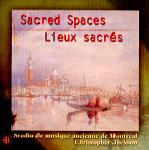The choral and brass music of Giovanni Gabrieli has been very popular with choirs and record labels ever since the late-1960s when the Gregg Smith Singers, Texas Boys Choir, Edward Tarr Brass Ensemble, and the legendary organist E. Power Biggs, along with producer John McClure traveled to St. Mark’s Basilica in Venice and made a then-revolutionary on-location recording that attempted to authentically re-create the sound and atmosphere of the 16th-century repertoire’s original setting. Of course, Monteverdi is a perennial favorite with choral groups because of his music’s uniformly masterful vocal writing, ultra-sensitivity to text-setting, and dramatic impact. Unfortunately, these multi-part works–especially the Gabrieli pieces that often involve antiphonal choral and instrumental forces–can prove difficult to record because of the problems with spatial orientation and miking of various groups that have to perform both as distinctly separate entities and in full-ensemble units. The works on this program have been recorded before–most notably the Monteverdi Magnificat and the Gabrieli In eclesiis motet. However, the performances and engineering prove equal to the better existing versions, exhibiting both the virtues (luminous choral sound, vibrant brass, and overall full-bodied textures and dynamics) and flaws (occasionally quirky balances between smaller and larger groups, texts obscured or obliterated by resonant acoustics and density of sound) of those same productions.
Christopher Jackson and his choir and instrumental ensemble really excel in the “dialogue” pieces–Monteverdi’s motets Exaudi me Domine (for four choirs) and six-voice Beatus vir–where, with seamless dexterity and unhesitating dramatic flair they toss lines among different sections of the choir as if a real, fast-paced conversation were in progress. This is a lot harder than it may seem, and these singers (and their conductor) are to be commended for successfully bringing it off. The Beatus vir alone is worth the price of the disc–as is the final work, Monteverdi’s lively and sometimes harmonically surprising Gloria, which not only demands solid technique from the choir but also virtuoso work from a group of vocal soloists. While in terms of repertoire this disc doesn’t add anything new to the discography, it would serve very nicely as a reference edition for any or all of the works in question–and would make a fine introduction to these composers for listeners new to their music.
































